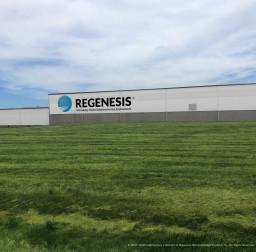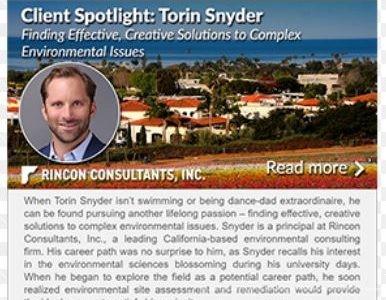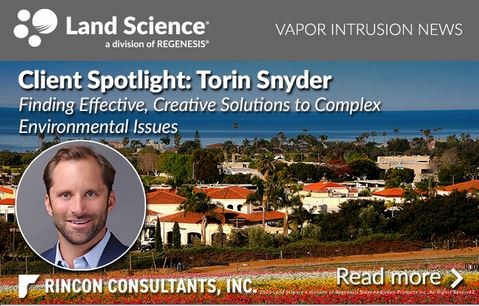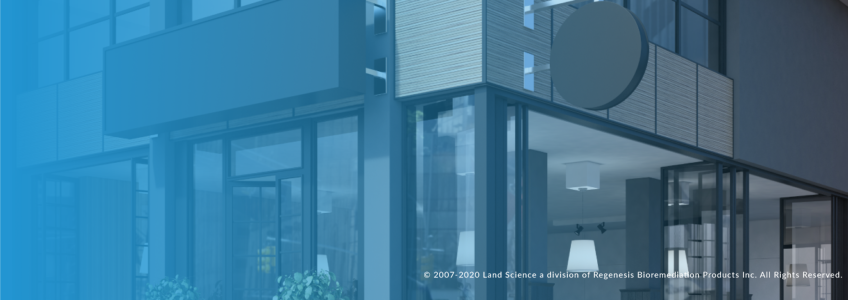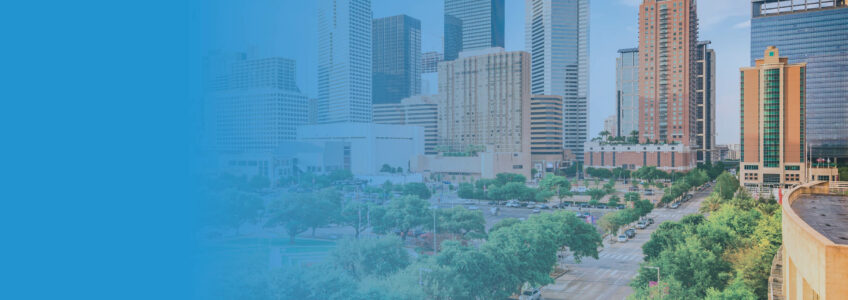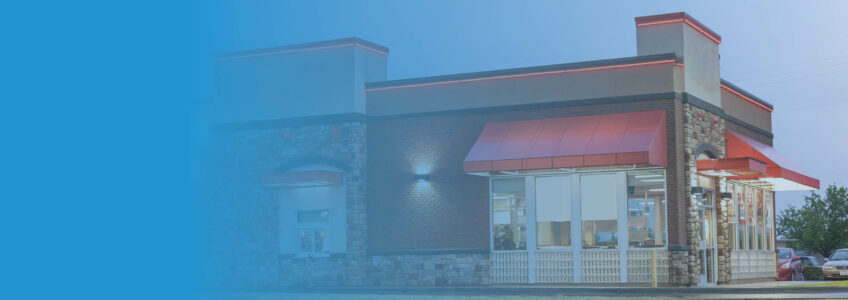Land Science Sheds Light on How Office Worker Migration Trends Intensify Vapor Intrusion Concerns
SAN CLEMENTE, Calif.–(BUSINESS WIRE)–The “new normal” for office workers post-COVID-19 is expected to look very different from today’s landscape, with leading experts projecting a move away from traditional high-rise offices toward new construction of low-rise industrial parks that enable continued social distancing. Land Science, a division of REGENESIS, is actively addressing the increased vapor intrusion risk resulting from the rising trend in new office park construction on brownfields and other environmentally distressed properties—in an aim to mitigate the long-term health risks these contaminants pose to workers.
COVID-19 is Driving a Trend Away from Traditional Office Workspaces
The COVID-19 pandemic resulted in a dramatic shift in workplace geography as workers moved from centralized office locations to home-based offices. Stanford economist Nicholas Bloom, a leading researcher studying the work-from-home trend, notes: “[An] incredible 42 percent of the U.S. labor force is now working from home full time.” Bloom also suggests that new office building construction will be altered post-COVID-19 based on an increased desire for social distancing. He states, “instead of building more office skyscrapers – which has been the dominant theme over the past 40 years – I predict that COVID-19 will dramatically shift the trend to industrial parks with low-rise buildings.”
The predicted shift to new office spaces at former industrial parks matches established construction trends in the residential and mixed-use building sectors. Due to inexpensive land, tax credits and other incentives, redevelopment of these former brownfields into living and retail space has been robust during the past decade.
Increase in Risks to Exposure of Potential Toxic Chemical Vapors
This office worker migration trend will result in a significant increased risk for worker exposure to potentially toxic chemical vapors left behind from past industrial activity. Chemical vapors are formed when substances containing chlorinated solvents, petroleum hydrocarbons or other volatile compounds commonly used in industry are spilled or improperly disposed of. Over time, these chemicals migrate through soil, contaminating groundwater and forming chemical vapor plumes.
Building occupants might be at risk of exposure to indoor air containing these vapors if a building is constructed within a contaminant vapor plume footprint. Inhalation of chemical vapors is often hazardous to human health, even at indoor air concentrations not detected by smell.
Effective Contaminant Vapor Barriers Address Risk
Land Science’s vapor intrusion mitigation systems incorporate the latest technological advances to offer the highest chemical protection available. These advanced systems comprise patented, state-of-the-art materials, including metalized films and nitrile-modified asphalt sealants that offer up to one-hundred times more chemical protection than other vapor intrusion mitigation systems like plastic sheets with taped seams and spray-applied waterproofing “boots.”
While offering the highest level of protection against vapor intrusion, these systems are often easier and faster to install and are priced competitively. Brownfield property developers are rapidly increasing the incorporation of these systems into their building plans as a means to address any potential vapor intrusion risk, known or unknown, and to ensure development stays on schedule.
Preemptive Installation May Be Less Expensive Than Investigation and Monitoring
A vapor mitigation system’s cost is insignificant relative to a new building project, and Land Science’s certified applicators can install these advanced systems quickly without delaying construction.
Comparative cost analyses have shown that it is often less expensive to proactively install a contaminant vapor barrier rather than investigate and monitor whether it is needed. Once installed, these vapor mitigation systems provide a high level of assurance for personal safety. According to the U.S. EPA’s Brownfields Technology Primer: “Incorporating relatively inexpensive mitigation (prevention) techniques into the construction of new buildings, rather than retrofitting them later, will result in significant cost savings and help avoid the occurrence of vapor intrusion in the future.”
ABOUT REGENESIS and LAND SCIENCE: Founded in 1994, REGENESIS is an expert provider of in situ soil, groundwater, and vapor intrusion remediation products and services. Land Science, a division of REGENESIS, offers a full line of vapor intrusion mitigation technologies and is the safe and effective choice for leading engineering, construction, and environmental consulting firms serving a broad range of clients, including developers, insurance companies, manufacturers, municipalities, regulatory agencies, and federal, state and local governments.
©2021 All rights reserved. REGENESIS and PlumeStop, are registered trademarks of Regenesis Bioremediation Products Inc.
Contacts
MEDIA CONTACT:
Leslie Licano, Beyond Fifteen Communications, Inc.
regenesis@beyondfifteen.com; 949.733.8679
December 2020 Land Science Newsletter
|
November 2020 Land Science Newsletter
5 Reasons to Consider a Preemptive Vapor Barrier to Protect Your Property InvestmentHistorically, easily-punctured thin-mil plastic sheets or inflexible and difficult-to-seal High Density Polyethylene (HDPE) Barriers were the only option for vapor mitigation at large warehouses or sites where regulatory requirements were not a driving risk factor. These solutions offered either chemical resistance or constructability, but not both. Composed of an innovative, metalized-film, MonoShield sets the standard for preventing diffusion and permeation of chemical vapors. Its nitrile-based asphalt latex ensures a seal far more effective and easier to apply than tape-based or heat-welded systems. Download the ebook to learn more.
|
November 2020 Land Science Newsletter
5 Reasons to Consider a Preemptive Vapor Barrier to Protect Your Property InvestmentHistorically, easily-punctured thin-mil plastic sheets or inflexible and difficult-to-seal High Density Polyethylene (HDPE) Barriers were the only option for vapor mitigation at large warehouses or sites where regulatory requirements were not a driving risk factor. These solutions offered either chemical resistance or constructability, but not both. Composed of an innovative, metalized-film, MonoShield sets the standard for preventing diffusion and permeation of chemical vapors. Its nitrile-based asphalt latex ensures a seal far more effective and easier to apply than tape-based or heat-welded systems. Download the ebook to learn more.
|
October 2020 Land Science Newsletter
|
REGENESIS Expands U.S. Manufacturing and Distribution Operations
SAN CLEMENTE, Calif.–(BUSINESS WIRE)–REGENESIS, the recognized leader in soil and groundwater remediation solutions and vapor intrusion mitigation technologies, is proud to announce it has expanded its operations to include a new state-of-the-art manufacturing and distribution warehouse strategically located outside of Nashville, Tenn. Enhancing the production and warehousing of its Land Science division’s full-suite of vapor mitigation technologies and REGENESIS’ soil and groundwater remediation solutions offers clients greater flexibility, while providing improved control over delivery times due to the facility’s central location.
“REGENESIS and Land Science have established a reputation for going above and beyond in the service of our clients”
The facility spans six acres and offers 70,000 square feet of office, lab and warehousing space. REGENESIS is investing significant time and money in retrofitting the former brownfield site (which previously housed a wire manufacturing operation) with the latest in temperature-controlled storage, a QA/QC lab and milling capabilities, among other key features. In addition, REGENESIS is committed to improving the site with green initiatives that include reforesting the land.
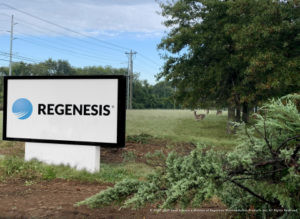 “Keeping pace with demand for our popular and effective environmental solutions made the decision to expand a simple one,” Scott Wilson, president and CEO of REGENESIS and Land Science, explains. “Our clients have come to expect exceptional service and proven results and we believe the new facility positions us well for continued growth and future demand. Plus, this new facility’s central location will allow us to reach two-thirds of the U.S. population within two days.”
“Keeping pace with demand for our popular and effective environmental solutions made the decision to expand a simple one,” Scott Wilson, president and CEO of REGENESIS and Land Science, explains. “Our clients have come to expect exceptional service and proven results and we believe the new facility positions us well for continued growth and future demand. Plus, this new facility’s central location will allow us to reach two-thirds of the U.S. population within two days.”
The expansion is also a response to the growing market for Land Science’s technologies. In just the last year, Land Science, the industry leader in vapor intrusion mitigation solutions, announced a new and greatly improved suite of vapor barrier systems that offer up to 100 times the chemical resistance of other barrier systems on the market. The new products address a wide spectrum of sites and offer the safest and most-effective vapor barrier solutions currently available. More than five million square feet have been installed to date.
REGENESIS’ popular PlumeStop micron-scale activated carbon technology designed to inhibit the spread of contaminant plumes has also driven the need to expand. PlumeStop is the only in situ amendment effectively addressing PFAS risk. It can be applied under low-pressure injection, which solves the problem of excessive costs incurred with pump and treat systems. Through the use of a proprietary organic polymer dispersion chemistry, the activated carbon achieves high distribution through the subsurface and removes contaminants like PFAS rapidly from groundwater.
Committed to delivering the safest, most effective remediation solutions on the market, REGENESIS is dedicated to ensuring on-time delivery and quality control, while continuing to push the envelope on improving performance and ease of installation across its environmental solutions. Its new cutting-edge manufacturing and distribution facility reflects its commitment to excellence.
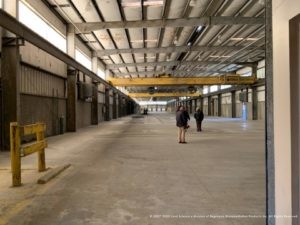 “REGENESIS and Land Science have established a reputation for going above and beyond in the service of our clients,” concludes Wilson. “Our commitment to developing groundbreaking environmental solutions is unparalleled in the industry and we are excited about the next chapter in our company’s history.”
“REGENESIS and Land Science have established a reputation for going above and beyond in the service of our clients,” concludes Wilson. “Our commitment to developing groundbreaking environmental solutions is unparalleled in the industry and we are excited about the next chapter in our company’s history.”
For more information about Land Science’s full line of vapor barrier systems, please visit www.landsciencetech.com or reach out to your regional technical representative. For more information about PlumeStop and how it is effectively addressing PFAS, go to www.pfastreatment.org.
ABOUT REGENESIS and LAND SCIENCE: Founded in 1994, REGENESIS is an expert provider of in situ soil, groundwater and vapor intrusion remediation products and services. Land Science, a division of REGENESIS, offers a full line of vapor intrusion mitigation technologies and is the safe and effective choice for leading engineering, construction and environmental consulting firms serving a broad range of clients, including developers, insurance companies, manufacturers, municipalities, regulatory agencies and federal, state and local governments.
©2020 All rights reserved. PlumeStop, Land Science, and TerraShield, are registered trademarks of Regenesis Bioremediation Products Inc.
September 2020 Land Science Newsletter
|
Ease of Installation Saves Time and Money for Preemptive Solution To Mitigate Potential Gasoline Vapors
Project snapshot highlights:
- Nitra-Seal protects future restaurant workers and guests
- Former Gas Station
Property developers for a national restaurant chain planned a new restaurant building on an old gas station in Galveston, Texas. It is common practice in the retail restaurant industry that when confronted with building a restaurant on a former gas station, the property developers will specify a vapor mitigation system (VMS) into the construction plan. The VMS serves as a preemptive measure to address gasoline contaminants that might have escaped detection during the site closure process. In these instances, the property developers require that the vapor mitigation system installation be completed efficiently and at a competitive cost while providing comparable or better chemical resistance. After evaluating VMS options, the property development team specified Nitra-Seal as the technology best suited for this purpose. According to the Land Science certified applicator, in comparing their experience installing generic styrene-butadiene-rubber asphalt emulsions, Nitra-Seal’s spray-applied nitrile-advanced asphalt latex core material was easier to apply and cured more rapidly. This saved time and money for the VMS installation, improving the project’s overall construction efficiency, and enabling the restaurant to proceed toward its opening.
Nitra-Seal Ensures Worker Safety For New Office Campus
Project snapshot highlights:
- New Office Campus in Pennsylvania
- Site-Specific Design for Unique Foundation Layout
- 16,000 Square Feet Installed
An established, construction services company was developing a new corporate campus on a former industrial manufacturing site where chemical degreasing agents were used. Prior to the building’s planned construction, an investigation was conducted, identifying chlorinated volatile organic compounds (VOCs) in the subsurface. Based on the investigation results, the project stakeholders specified the installation of a vapor mitigation system to address the potential VOC vapor intrusion risk to future building occupants. The consultant and their client were familiar with Land Science’s full suite of vapor barrier systems and had installed their vapor mitigation technologies at other building sites in the past. The team specified Nitra-Seal® for this project based on its top-performing chemical resistance and installation efficiencies compared to other spray-applied barrier systems considered. The building’s unique foundation layout required a nuanced approach and site-specific design support from the Land Science team. The Land Science Certified Applicator installed the Nitra-Seal vapor mitigation system efficiently and according to specifications, allowing the new office campus construction to proceed without delay.
Nitra-Seal Facilitates National Restaurant Chain Expansion into Growing Texas Market
Project snapshot highlights:
- Petroleum Hydrocarbon Vapor Contaminants Effectively Mitigated
- Solution Chosen Based on Best Combination of Chemical Resistance,Installation Efficiency and Price
An expanding quick-service restaurant (QSR) chain planned a new store in the rapidly growing central Texas market at a former gasoline station site. Although there was no active environmental incident associated with past use, it is common for petroleum hydrocarbons (PHCs) to remain in the subsurface, undiscovered at former gas station sites. Using their knowledge and experience in developing similar properties, the QSR client recognized the potential risk of petroleum hydrocarbon (PHC) vapor intrusion. To ensure their future associates’ and guests’ well-being, the QSR client specified installing the Nitra-Seal® vapor mitigation system as a preemptive measure to protect against PHC vapor intrusion. They chose Nitra-Seal because it provided the best combination of chemical resistance, installation efficiency and price compared to other similarly priced vapor barrier systems. The Land Science certified applicator completed the installation according to manufacturer recommendations within aggressive time and budget constraints, allowing the restaurant to proceed toward its scheduled opening in the Fall of 2020.






 In Sacramento, CA, Roebbelen Contracting Inc. was engaged by their client to build an electrical substation in the downtown area. Due to extensive industrial use at the site historically, heavy subsurface contamination posed a significant vapor intrusion risk. As a result, the development was in need of an effective vapor mitigation system as part of the construction project. The environmental consultant at the site recommended TerraShield from Land Science. TerraShield offers the highest level of chemical resistance because of its nitrile asphalt latex spray-applied core and metalized film, providing the highest level of protection from contaminant vapors available on the market today.
In Sacramento, CA, Roebbelen Contracting Inc. was engaged by their client to build an electrical substation in the downtown area. Due to extensive industrial use at the site historically, heavy subsurface contamination posed a significant vapor intrusion risk. As a result, the development was in need of an effective vapor mitigation system as part of the construction project. The environmental consultant at the site recommended TerraShield from Land Science. TerraShield offers the highest level of chemical resistance because of its nitrile asphalt latex spray-applied core and metalized film, providing the highest level of protection from contaminant vapors available on the market today.









 Nitra-Seal® is a new advanced nitrile composite barrier system. It represents an update/improvement on current vapor barrier systems. An acknowledged weakness in these systems is in the penetration and perimeter termination locations, where spray-applied core material composed of Styrene-Butadiene Rubber (SBR) latex/asphalt is used. Nitra-Seal offers a substantial upgrade as it employs a more chemically resistant nitrile latex instead of the more susceptible SBR latex. Nitra-Seal is a composite system creating the ideal blend between constructability and chemical resistance by using both high density polyethylene (HDPE) and nitrile-advanced, spray-applied asphalt core. Learn more and download the product brochure below.
Nitra-Seal® is a new advanced nitrile composite barrier system. It represents an update/improvement on current vapor barrier systems. An acknowledged weakness in these systems is in the penetration and perimeter termination locations, where spray-applied core material composed of Styrene-Butadiene Rubber (SBR) latex/asphalt is used. Nitra-Seal offers a substantial upgrade as it employs a more chemically resistant nitrile latex instead of the more susceptible SBR latex. Nitra-Seal is a composite system creating the ideal blend between constructability and chemical resistance by using both high density polyethylene (HDPE) and nitrile-advanced, spray-applied asphalt core. Learn more and download the product brochure below.








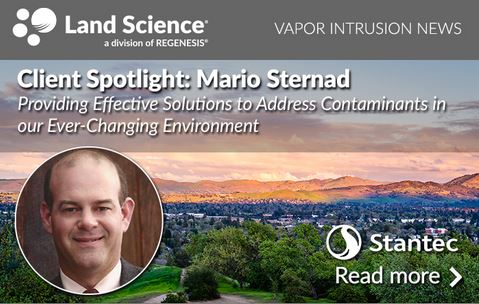





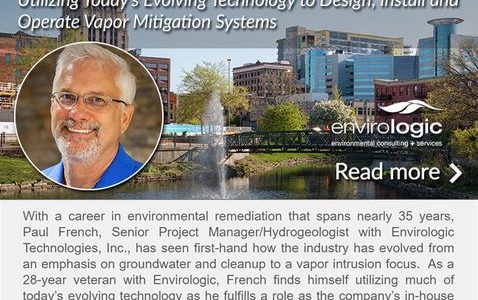


 A large automotive and supply company planned to build its new corporate headquarters on a 4.5-acre brownfield site recently acquired in Southfield, MI. Soil and groundwater sampling on the property revealed the presence of trichloroethylene (TCE) and polynuclear aromatic hydrocarbons (PAHs). TCE was also identified in soil gas beneath the site. Within the footprint of the planned building itself, contaminant concentrations were found to be in excess of applicable indoor air quality screening levels. Recognizing the unique characteristics of the site as well as the significant levels of contamination present,
A large automotive and supply company planned to build its new corporate headquarters on a 4.5-acre brownfield site recently acquired in Southfield, MI. Soil and groundwater sampling on the property revealed the presence of trichloroethylene (TCE) and polynuclear aromatic hydrocarbons (PAHs). TCE was also identified in soil gas beneath the site. Within the footprint of the planned building itself, contaminant concentrations were found to be in excess of applicable indoor air quality screening levels. Recognizing the unique characteristics of the site as well as the significant levels of contamination present, 


 Scott Wilson
Scott Wilson Ryan Miller
Ryan Miller


